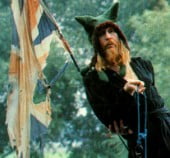 Over the weekend, I searched for, eventually located, tortuously downloaded, and – after scrabbling around for and fathoming out how to use the appropriate software – unzipped the entire series of Sir Henry at Rawlinson End, the late Vivian Stanshall’s work of dramatic genius which appeared on the John Peel radio show in the UK many, many years ago. It was a constructive and socially useful endeavour, at least by the standards of Hong Kong politicians and activists who spent the time forging Lightbulbgate into a weapon with which to beat luckless Chief Executive Donald Tsang.
Over the weekend, I searched for, eventually located, tortuously downloaded, and – after scrabbling around for and fathoming out how to use the appropriate software – unzipped the entire series of Sir Henry at Rawlinson End, the late Vivian Stanshall’s work of dramatic genius which appeared on the John Peel radio show in the UK many, many years ago. It was a constructive and socially useful endeavour, at least by the standards of Hong Kong politicians and activists who spent the time forging Lightbulbgate into a weapon with which to beat luckless Chief Executive Donald Tsang.
The premise is that in drafting last week’s policy address, Sir Bow-Tie deliberately included a measure to subsidize citizens’ purchases of energy-efficient lightbulbs in order to boost business for his son’s father-in-law, who is the local Philips Lighting distributor. Not even his most cynical, distrustful and malicious critics believe that Donald would stoop to such laughably desperate depths. (Not to mention the embarrassment he must feel now the world has learned that his boy married into trade.) So the charge is that he erred in not declaring an interest – or at least an offspring’s spouse’s parent’s. Essentially, Donald has handed his detractors an opportunity on a plate to give him a good kicking and throw accusations around of collusion with big business (though noble companies like Li Ka-shing’s Hongkong Electric are hardly going to benefit if we all switch from incandescent to fluorescent bulbs).
Or that’s what it seems. But could it be that Donald is in fact displaying Machiavellian powers of deviousness here? Could it be that he inserted this bit of quasi-nepotism into his speech in order to distract his opponents’ easily amused attentions away from the wide range of far more dismal proposals in the policy agenda?
The only parts of the policy address that weren’t junk were the plans to conserve some older buildings in over-developed Central and to ease up a bit on the restrictions that prevent people from using underutilized space in old factory buildings. And these aren’t Donald’s ideas. In fact, despite the touching memories of gamboling barefoot, Huck Finn-like, along Hollywood Road as a young lad, he hates them. As a colonial-trained bureaucrat, he firmly believes old public buildings are for knocking down, so the government can sell the land and add to its bulging reserves; and he is no fan of opening up private space for a wider range of economic uses without the government taking a big cut up-front. These ideas were pushed by development secretary Carrie Lam Cheng Yuet-ngor, and he reluctantly agreed only because otherwise he would have had nothing of any substance to announce last Wednesday.
The rest was overspending on ludicrous infrastructure projects, misguided attempts at picking economic winners and the usual tired old blather about kids, old folk, the glorious motherland and bunny rabbits. So much to criticize – but so easy for simplistic opponents to overlook when you dangle a non-scandal about environmentally friendly electrical fixtures in front of them.
Sir Henry: I don’t give a toss what you’ve done with me when I’ve shrugged off m’ mortal coil… Shove a bit of flex up m’ back passage, stick a lightbulb in m’ mouth and stand me in the hall. (Sniff) Mind you, if you’re using electricity you’ll have to dry me out first.
Next time, Hubert comes back to earth and realizes that Donald could, sadly, never be so subtle or wily.
